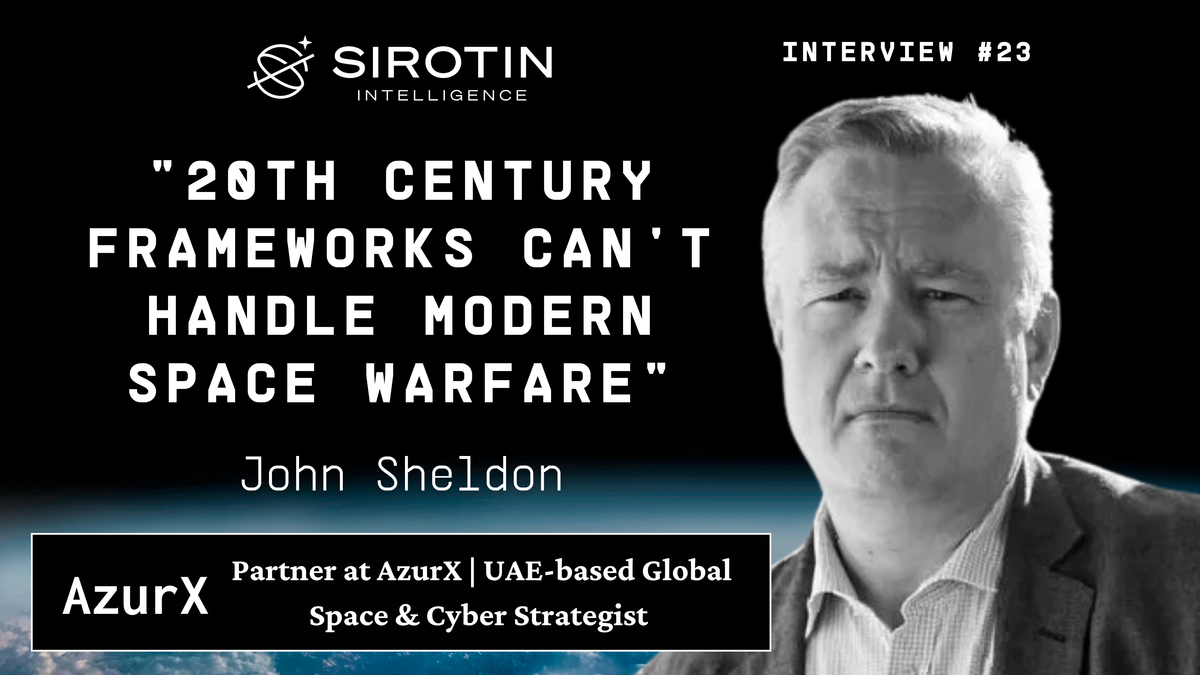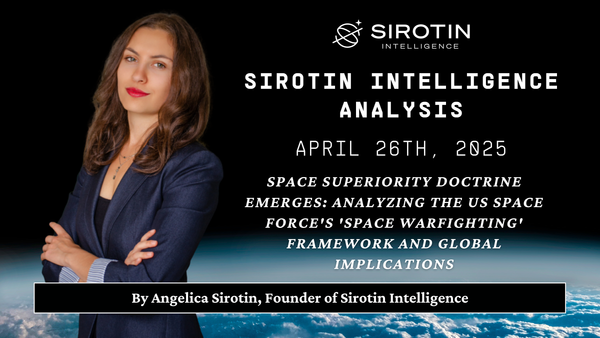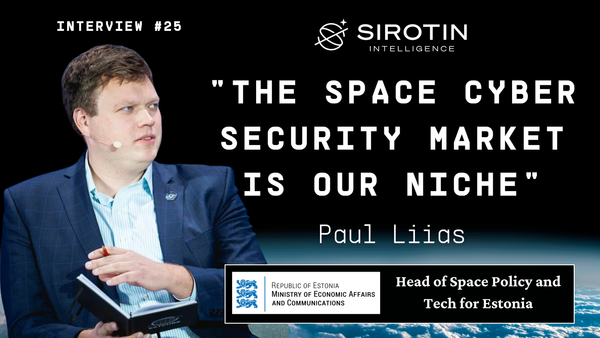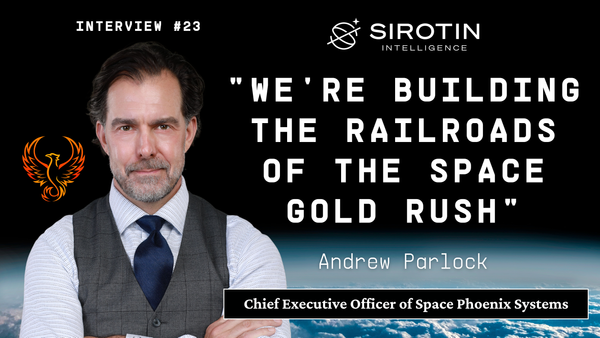"20th Century Frameworks Can't Handle Modern Space Warfare": AzurX Partner, Saudi Space Policy Architect & UAE Space Security Veteran on Why Traditional Defense Thinking Has Failed
Space security expert Dr. John Sheldon, Partner at AzurX and architect of Saudi Arabia's space policy, explains why traditional defense frameworks fail to address modern space warfare challenges in an era of dual-use technologies and blurred commercial-military boundaries.

John Sheldon speaks with the measured precision of someone who has spent decades contemplating orbital dynamics and space power theory. Behind his thoughtful demeanor lies an intellect that has shaped space security frameworks across multiple continents, from Washington think tanks to Gulf monarchies.
"Space systems are fundamentally dual-use in nature," he explains, articulating the core challenge that has defined his 25-year career. "This creates unique governance challenges."
Fascinated by space since childhood during the Space Shuttle era, Sheldon transformed academic curiosity into strategic expertise, earning his doctorate from the University of Reading with a focus on space power theory. His path led through prestigious institutions like the School of Advanced Air and Space Studies, the Atlantic Council, and eventually to the corridors of influence in the United Arab Emirates, where since 2016 he has helped reshape Middle Eastern approaches to the ultimate high ground.
Now, as Partner at AzurX and the architect behind Saudi Arabia's space policy, Sheldon observes the rapidly evolving landscape with a clarity few can match. His warning resonates with growing urgency: "Space security can't be addressed in isolation anymore." The threats are multiplying, the lines between commercial and military activities blurring, and traditional frameworks proving inadequate for an increasingly contested domain.
In a field where technological capabilities, strategic thinking, and international politics converge, Sheldon stands at the intersection – not just witnessing the transformation of space power, but actively shaping its future.
What initially sparked your interest in space policy and geopolitics, leading you to pursue a career that spans academia, government advisory roles, and now your work with AzurX?
"I've been fascinated by space since I was a child growing up in Texas and the UK during the start of the Space Shuttle era," Sheldon recalls. "But what really solidified my professional interest was studying international relations at the University of Hull in the early 1990s. During my undergraduate studies, I became increasingly intrigued by the strategic dimensions of space—how satellites enable global communications, intelligence gathering, and military operations."
This early interest eventually led him to complete his PhD at the University of Reading, focusing on space power theory and its implications for international relations.
"Throughout my academic career at institutions like the School of Advanced Air and Space Studies and the University of Reading, I've tried to bridge the theoretical foundations of space policy with practical applications," he explains. "My work with think tanks like the Atlantic Council and the George C. Marshall Institute allowed me to translate academic concepts into policy recommendations."
When asked about his transition to advisory roles, Sheldon notes, "Working with the UAE Ministry of Defence was particularly eye-opening. It gave me firsthand experience with how emerging space powers approach capability development and strategic planning. These experiences directly inform my current work with AzurX, where we're helping clients navigate the increasingly complex intersection of commercial space ventures and national security interests."
"What's always fascinated me about space policy is the interplay between technological capabilities, strategic thinking, and international politics," Sheldon adds. "Space systems are fundamentally dual-use in nature, which creates unique governance challenges. Throughout my career, I've tried to maintain a multidisciplinary perspective that acknowledges these complexities rather than reducing space policy to simplistic formulations."
Given your extensive experience advising the UAE Ministry of Defence and your current role, how do you see emerging space powers in the Middle East reshaping the global space landscape in the coming years?
"The Middle East space sector is undergoing a remarkable transformation," Sheldon observes. "What makes the UAE approach particularly interesting is its comprehensive nature—they're not just focusing on building satellites or launching missions, but developing an entire ecosystem that encompasses education, research, commercial applications, and security dimensions."
He points to several key initiatives that demonstrate this holistic approach. "The Emirates Mars Mission wasn't just about planting a flag; it was about developing indigenous technical capabilities and inspiring a generation of scientists and engineers. Similarly, their investments in commercial space companies and international partnerships show a sophisticated understanding of how space power works in the 21st century."
"I believe we'll see Middle Eastern space programs increasingly influence global space governance," Sheldon continues. "They're bringing fresh perspectives on issues like space resource utilization, space traffic management, and the balance between commercial interests and national security. Their growing technical capabilities give them credibility in international forums that they didn't have a decade ago."
Sheldon also notes the regional dynamics at play. "There's a fascinating space race developing between the UAE, Saudi Arabia, and other regional powers. This competition is driving innovation and investment, but also creating opportunities for collaboration on shared challenges like climate monitoring and disaster management. How these dynamics evolve will significantly impact the global space landscape by the end of this decade."
"What's particularly significant about the UAE's approach is how they've leveraged international partnerships to accelerate capability development while simultaneously building indigenous expertise," Sheldon elaborates. "Their collaboration with South Korea on the KhalifaSat program exemplifies this approach—learning from established space actors while maintaining strategic autonomy. We're seeing similar patterns emerge with Saudi Arabia's partnerships and, to a lesser extent, with other Gulf states."
Sheldon also highlights the economic dimension. "Middle Eastern space programs were initially funded primarily through oil and gas revenues, but we're now seeing a conscious effort to use space activities as catalysts for economic diversification. The UAE Space Agency and the Mohammed Bin Rashid Space Centre have explicit mandates to stimulate private sector growth and contribute to knowledge economy objectives. This creates a different set of incentives compared to traditional space powers, potentially leading to more commercially-oriented approaches to international space cooperation."
Considering your transition from academic roles at institutions like SAASS to your current position in the private sector, how has your perspective on space security challenges evolved over the past decade?
"My thinking has evolved substantially," Sheldon acknowledges. "In academia, I approached space security primarily through theoretical and historical lenses—examining how space power relates to classical security theories and strategic thought. Those foundations remain valuable, but my experiences in government advisory roles and the private sector have added layers of practical understanding."
He elaborates on this evolution: "Working directly with defense ministries, I gained appreciation for the organizational and bureaucratic factors that shape space security decisions. Budget constraints, acquisition timelines, workforce development—these practical considerations often matter as much as grand strategy. In the private sector, I've seen how commercial innovations are fundamentally changing the security landscape, sometimes outpacing government ability to adapt regulatory frameworks."
The threat landscape has also transformed dramatically. "A decade ago, we were primarily concerned with kinetic anti-satellite weapons and deliberate radio-frequency interference. Today, we're dealing with a much more complex environment—cyber threats to space systems, the security implications of mega-constellations, proximity operations, and the blurring lines between commercial and government activities."
"Perhaps most significantly," Sheldon adds, "I've come to recognize that space security can't be addressed in isolation. The interdependencies between space and other domains—cyber, maritime, air, land—require integrated approaches to both threats and opportunities. My current work focuses heavily on these cross-domain challenges."
"One of the most profound shifts in my thinking concerns resilience," Sheldon continues. "In academic settings, I tended to focus on preventing hostile acts in space through deterrence and norms. While these remain important, I've become increasingly convinced that resilience—the ability to withstand, recover from, and adapt to attacks—is equally crucial. This shift parallels broader trends in security thinking, moving from prevention-focused approaches toward more holistic concepts that acknowledge the inevitability of some disruptions."
Sheldon also notes changing perspectives on commercial actors. "Early in my career, I viewed commercial space primarily through the lens of how it supports government capabilities. Now I see commercial entities as security actors in their own right—facing threats, making security decisions, and sometimes providing capabilities that were once exclusively governmental. This evolution reflects the growing sophistication and autonomy of the commercial space sector."
"The geopolitical context has shifted dramatically as well," he observes. "When I began my academic career, space security discussions centered primarily on US-Russia dynamics, with China as an emerging factor. Today, we're navigating a much more complex multipolar environment with numerous actors possessing significant space capabilities. This complexity makes traditional approaches to space security, based largely on bilateral Cold War models, increasingly inadequate."
Based on your work with various think tanks like the Atlantic Council and the George C. Marshall Institute, what do you see as the most significant gaps in current international space governance frameworks in addressing emerging threats?
"The fundamental problem is that our governance frameworks were designed for a different era," Sheldon states firmly. "The Outer Space Treaty and related agreements were created when space was the exclusive domain of superpowers and focused primarily on preventing nuclear weapons in orbit. Today's challenges—from space debris to resource extraction to commercial actors—simply weren't contemplated."
He identifies several specific gaps: "First, there's the issue of dual-use technologies. Most space capabilities can serve both civilian and military purposes, making it extremely difficult to regulate 'weapons' in space in any meaningful way. Second, we lack effective mechanisms for space traffic management as the orbital environment becomes increasingly congested."
"Perhaps most concerning," Sheldon continues, "is the absence of norms regarding proximity operations—when satellites maneuver close to others for inspection, servicing, or potentially harmful purposes. The lack of transparency and confidence-building measures in this area creates dangerous ambiguities that could lead to miscalculation."
Sheldon also points to institutional challenges: "The existing governance bodies, like the UN Committee on the Peaceful Uses of Outer Space, operate on consensus principles that make meaningful progress nearly impossible in today's geopolitical environment. And they often lack the technical expertise to address rapidly evolving capabilities."
"What we need," he concludes, "is a more adaptive, multi-stakeholder approach that involves commercial actors, civil society, and technical experts alongside traditional diplomatic channels. My work at the think tanks focused on developing these alternative governance models."
"There's also an urgent need to address the disconnect between terrestrial and space governance," Sheldon elaborates. "Space activities are increasingly integrated with critical infrastructure on Earth—from financial systems to agriculture to transportation—yet our governance approaches treat space as a separate domain. This artificial separation hampers effective risk management across these interconnected systems."
He points to specific technical challenges as well. "Our current frameworks provide almost no guidance on emerging capabilities like active debris removal, on-orbit servicing, and resource extraction. These activities involve complex questions about ownership, liability, and sovereignty that the existing treaties simply don't address. Without clearer rules, we risk both stifling innovation and creating dangerous precedents through unilateral actions."
"Another critical gap concerns enforcement mechanisms," Sheldon notes. "Even where rules exist, we lack effective means to ensure compliance. The challenges range from technical questions about attribution—determining who's responsible for harmful activities—to political questions about proportional responses to violations. My work at the Marshall Institute particularly focused on these enforcement challenges, examining how traditional security concepts like deterrence might apply in the space domain."
Sheldon also expresses concern about the growing divide between established and emerging space powers. "There's increasing tension between states that shaped the existing frameworks and those now developing capabilities under rules they had little role in creating. This representation gap undermines the legitimacy of governance efforts and creates incentives for some actors to operate outside established norms."
With your experience in both diplomatic service and defense advisory roles, what approaches do you believe would be most effective in developing international norms to prevent an uncontrolled arms race in space?
"Traditional arms control approaches face significant challenges in space," Sheldon begins. "Verification is extremely difficult, dual-use technologies complicate definitions, and major powers have divergent interests. Rather than pursuing comprehensive treaties that are unlikely to materialize, I believe we should focus on incremental norm-building and practical measures that enhance stability."
He outlines a multi-layered approach: "First, we need improved space situational awareness shared among all spacefaring nations. You can't have stability without transparency. Second, we should prioritize norms of responsible behavior—agreements on notification of maneuvers, minimum approach distances, and debris mitigation—rather than trying to ban specific technologies."
"The diplomatic strategy matters as much as the substance," Sheldon emphasizes. "Starting with like-minded countries to establish best practices, then gradually expanding participation, is more likely to succeed than universal approaches. And involving commercial actors is essential, as they're increasingly the ones setting de facto norms through their operations."
He notes that economic incentives can complement diplomatic efforts: "Insurance requirements, certification standards, and market access can create powerful motivations for responsible behavior. My experience suggests that these indirect approaches often prove more effective than direct regulation."
"Ultimately," Sheldon concludes, "preventing an arms race requires addressing the underlying security concerns that drive military space development. Confidence-building measures, crisis communication channels, and mutual vulnerability recognition are as important in space as they were for nuclear stability during the Cold War."
"History offers valuable lessons here," Sheldon continues. "The Limited Test Ban Treaty didn't emerge from abstract principles, but from shared concerns about nuclear fallout. Similarly, effective space norms will likely emerge from practical problems that affect all spacefaring nations—like orbital debris and radio frequency interference—rather than from idealized concepts of space as a weapons-free zone."
He elaborates on the role of technical communities: "Engineers and scientists can make crucial contributions by developing verifiable standards and technical means for monitoring compliance. The diplomatic community sometimes overlooks these technical dimensions, but my experience suggests they're often the foundation for effective governance. During my time with the Atlantic Council, we specifically worked to bridge these technical and diplomatic communities through track 1.5 dialogues involving both government officials and technical experts."
Sheldon also emphasizes the importance of domestic politics: "International norms are only effective when they're aligned with national interests as defined by key stakeholders. Part of my advisory work has focused on helping governments understand how certain norms actually advance their security and economic objectives, rather than just imposing constraints. This domestic legitimization is particularly important for emerging space powers that are sensitive to perceived limitations on their sovereignty."
"We should also acknowledge the deterrent value of certain capabilities," he adds, addressing a controversial point. "The reality is that some space-based systems and counter-space capabilities serve legitimate security functions by deterring aggression. The challenge is distinguishing between stabilizing and destabilizing capabilities, and creating norms that allow the former while limiting the latter. This nuanced approach is more likely to gain traction than blanket prohibitions."
Sheldon concludes with a note of urgency: "We face a narrow window of opportunity before technological developments and geopolitical competition further complicate these issues. The pace of commercial innovation and the proliferation of space capabilities mean that de facto norms are being established through practice even in the absence of formal agreements. Shaping these emerging norms through deliberate diplomatic efforts should be a priority for all major space actors."
How do you envision the interplay between commercial space initiatives and national space programs changing by 2030?
"We're witnessing a fundamental rebalancing of the relationship between public and private space activities," Sheldon observes. "The traditional model—where governments set requirements and industry executes—is giving way to a much more dynamic ecosystem where commercial innovation often leads and governments adapt."
By 2030, he predicts several major shifts: "National space agencies will increasingly transition from operators to customers, purchasing services rather than owning systems. We're already seeing this with NASA's Commercial Crew program and similar initiatives elsewhere. This allows agencies to focus resources on truly cutting-edge exploration and science that isn't commercially viable yet."
"The security implications are profound," Sheldon continues. "Military space organizations will rely heavily on commercial capabilities for what were once considered inherently governmental functions. This creates new vulnerabilities but also resilience through distribution and redundancy."
He anticipates significant changes in international cooperation: "As commercial platforms become more capable, traditional government-to-government space partnerships will be complemented by public-private international consortia addressing shared challenges like orbital debris removal and space traffic management."
Sheldon does note potential challenges: "The commercialization trend isn't uniform across all space sectors or all countries. We'll likely see a complex mosaic where some nations maintain state-centric approaches while others embrace commercial leadership. Managing these different models within shared orbital regimes will require novel governance approaches."
"What excites me most," he concludes, "is how commercial innovation might enable entirely new types of space activities by 2030—from in-space manufacturing to resource utilization—potentially creating economic value that dwarfs today's space economy. My work at AzurX focuses on helping both government and commercial clients navigate this rapidly evolving landscape."
"The financing models are evolving in particularly interesting ways," Sheldon elaborates. "We're seeing the emergence of specialized space investment funds, greater willingness among institutional investors to support space ventures, and innovative public-private financing mechanisms. By 2030, I expect space finance to be a sophisticated sub-sector with models tailored to different segments of the space economy, from launch services to data applications."
He points to specific sectors poised for transformation: "Earth observation is undergoing a revolution, moving from periodic, high-resolution imagery toward persistent monitoring with diverse sensors. This capability will transform everything from environmental management to financial intelligence. Similarly, satellite communications are evolving from dedicated systems toward flexible, software-defined networks that can rapidly adapt to changing demands."
"The geopolitical dimensions shouldn't be underestimated," Sheldon warns. "Commercial space capabilities are already influencing power dynamics between nations. By 2030, a country's ability to leverage commercial space services—whether domestic or international—may matter more than their indigenous government space programs. This creates both opportunities and vulnerabilities, particularly for countries that have traditionally defined space power in terms of government capabilities."
Sheldon anticipates significant regulatory evolution: "The current regulatory frameworks, designed primarily for traditional space activities, will undergo substantial revision to accommodate new business models and capabilities. The challenge will be balancing innovation with other societal goals like security, sustainability, and equitable access. My work with both government and commercial clients focuses heavily on navigating this evolving regulatory landscape."
"Workforce development presents both challenges and opportunities," he notes. "The rapid growth of commercial space is already creating skills shortages across multiple disciplines. By 2030, we'll likely see specialized educational programs and career pathways that don't exist today. This human capital dimension is often overlooked in discussions about the future of space, but it may ultimately be the limiting factor for growth in both commercial and government sectors."
Sheldon concludes with reflections on broader societal impacts: "Beyond the direct economic and security implications, the growth of commercial space will increasingly influence how societies understand their relationship with space. The democratization of space access and data will empower new stakeholders and potentially change public perceptions about humanity's future beyond Earth. This cultural dimension may ultimately prove as significant as the technological and economic changes we're witnessing."
About John Sheldon
John B. Sheldon, Ph.D., has over 25 years experience in the space, cyberspace, and defence sectors in and outside of the Middle East, having worked for both commercial and government entities in the UK, United States, Europe, Japan, and the United Arab Emirates.
As a Partner at AzurX, John’s focus is space, cyber, Web3, and other strategic technologies and their critical roles in developing economies and accessing untapped human potential. From October 2021 through to March 2022 John was seconded to the Saudi Space Commission where he drafted the Saudi space policy and was part of the team that audited the Saudi space strategy. From April 2023 to October 2024 John closely assisted senior leadership at EDGE Group PJSC in the UAE in developing the company’s space strategy and building out its space business known as FADA.
John has advised numerous governments on space and cyber issues, to include governments in the United States, United Kingdom, Japan, Saudi Arabia, United Arab Emirates, and Poland. John has also published extensively on strategic matters, to include space and cyberspace policy and strategy, in various trade and scholarly publications.
John holds BA (Honours) and MA degrees from the University of Hull, United Kingdom, and a Ph.D. in International Politics and Strategic Studies from the University of Reading, United Kingdom. Originally from the United Kingdom, John has lived for many years in Germany, the United States, and has lived and worked in the United Arab Emirates since 2016.
For more information, reach out to John at j.sheldon@azurx.com





